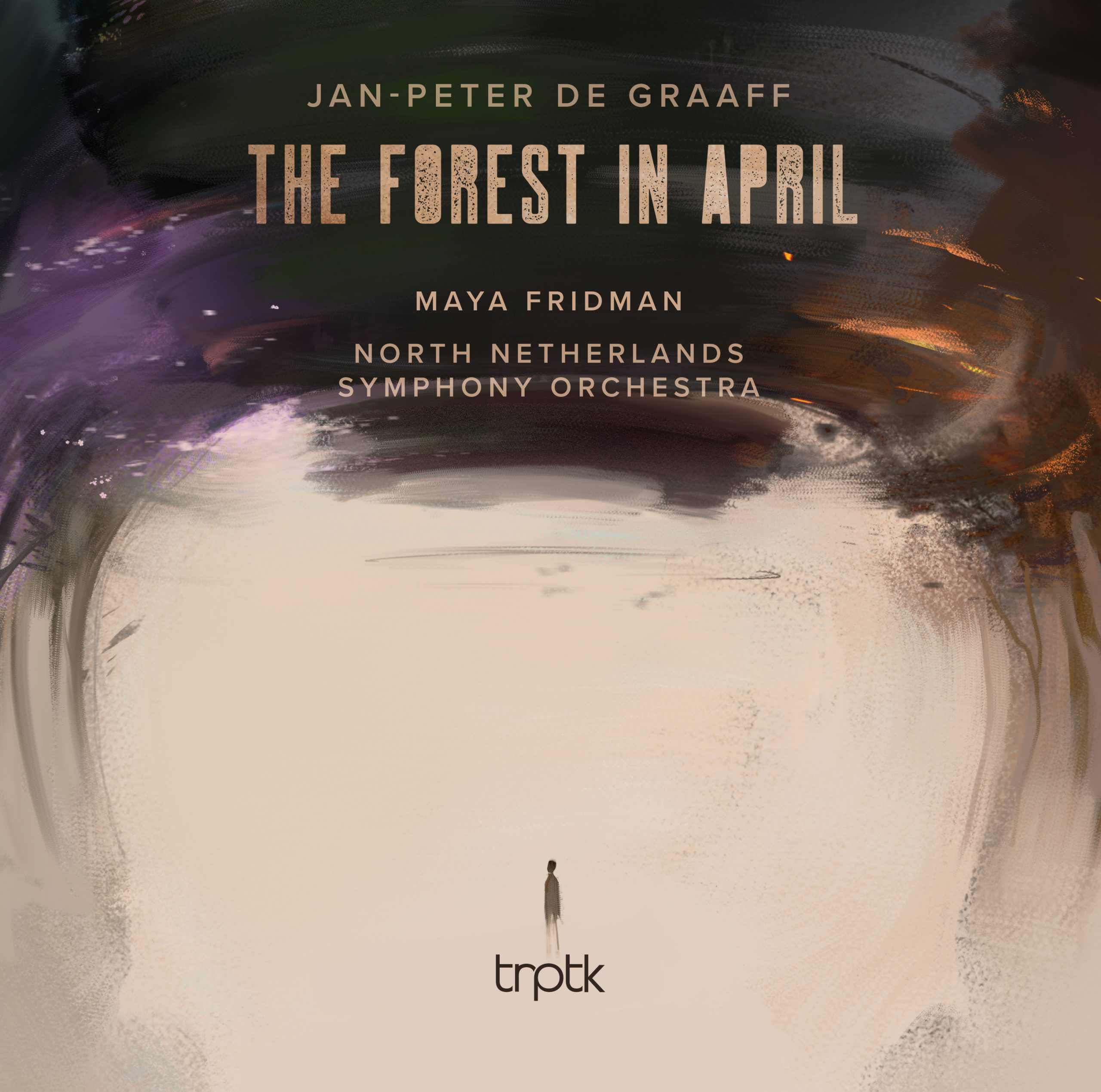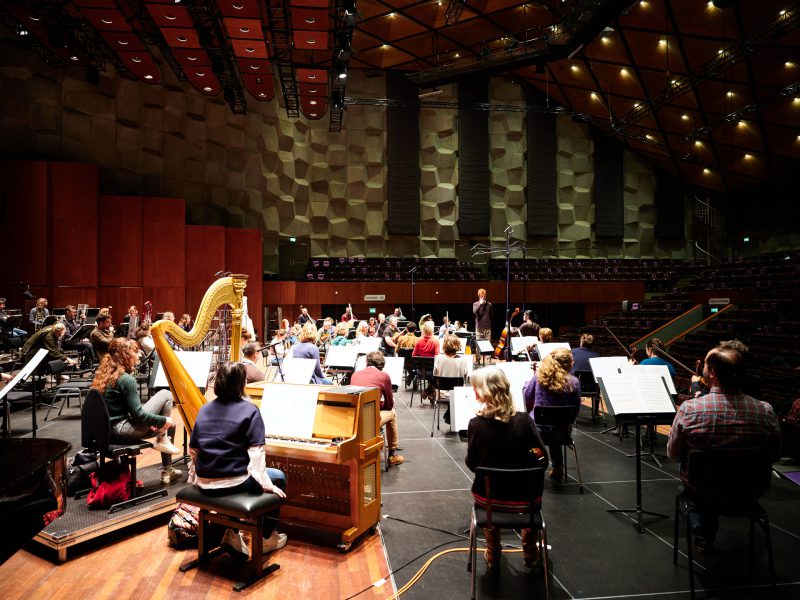In The Forest in April, the relationship between soloist and orchestra is central as a metaphor for the relationship between man and nature.
Maya Fridman, North Netherlands Symphony Orchestra, Sander Teepen & Nicolò Foron
De Graaff: The Forest in April
About the album
Composer Jan-Peter de Graaff (Terschelling, 1992) studied with Klaas ten Holt, Guus Janssen, Calliope Tsoupaki and Diderik Wagenaar. He successfully concluded his studies at the Royal Conservatory with the opera All Rise. De Graaff is not part of the fashionable minimal movement, but composes ‘old-fashioned’ complex. His music is richly orchestrated, melodious and transparent at the same time. He also likes to make use of theatrical elements.
For cellist Hans Woudenberg, De Graaff wrote Rimpelingen (“ripples”) in 2017 on the occasion of his farewell to Asko|Schönberg, a work that was received with joy by the trade press. In season 2020-2021 cellist Maya Fridman was artist in residence at the Utrecht-based TivoliVredenburg. Through the artistic leadership of this venue, contact was made with the composer and a new initiative came about, with support from the Fonds Podiumkunsten. De Graaff was commissioned to compose a new work for Fridman, which was later titled Concerto no. 5 “The Forest in April”.
In March 2021 The Forest in April had its premiere in Utrecht, performed by Maya Fridman and the North Netherlands Symphony Orchestra conducted by Nicolò Foron. Enthusiastically, De Volkskrant writes: “After a solo cadence that lasts for minutes, in which Fridman is allowed to indulge her qualities as a playing beast, a fierce battle ensues. Angular orchestral motifs alternate with the cello’s seething dissonance. Even here the composer mixes the timbres so skilfully that beauty lurks even in the discordant sounds.”
De Graaff: “In the composition, the relationship between soloist and orchestra is central as a metaphor for the relationship between man and nature. In The Forest in April you can hear how the cellist influences the orchestra and how the orchestra slowly mutates into a monstrosity that collapses under its own weight. The work ends with a Requiem, in which the orchestra blows itself up, as it were. Lonely the lamento of the cello floats over the destruction of the orchestra. A deeply emotional moment.”
In June 2021, the North Netherlands Symphony Orchestra additionally recorded Concerto no.4 “Rimpelingen”. This time under the direction of conductor Sander Teepen, with another starring role for cellist Maya Fridman. In Vrije Geluiden De Graaff told us that he was inspired by pebbles crunching on the water: “Then I zoom in on the ripples on the surface of the water and on what’s happening underneath, that’s the ensemble. That’s where a complete world emerges, which eventually fades out.”
Tracklist click to play/pause
-
Jan-Peter de Graaff
Concerto No. 4 "Rimpelingen"
-
Prelude
1:231:23
-
I. Passacaglia
8:428:42
-
Interlude
1:031:03
-
II. Scherzo
8:248:24
-
Postlude
1:281:28
-
-
Jan-Peter de Graaff
Concerto No. 5 "The Forest in April"
-
I. The Forest
8:468:46
-
II. The Echo Chamber
13:5313:53
-
III. Requiem
7:267:26
-
More information
| Label | TRPTK |
|---|---|
| Genre(s) | Classical – Contemporary (> 1920) |
| Artist(s) | Maya Fridman Nicolò Foron North Netherlands Symphony Orchestra Sander Teepen |
| Composer(s) | Graaff, Jan-Peter de |
| Recording location(s) | De Oosterpoort - Grote Zaal, Groningen (NL) |
| Recording date(s) | March - June 2021 |
| Cat. No. | TTK 0076 |
|---|---|
| Release date |
November 26th, 2021 |
| Additional links |
"It is masterly how many colors De Graaff manages to put in the orchestral part. The North Netherlands Symphony Ochestra is on point and enters into battle with Fridman as a unit. Impressively subdued are the passages in which Fridman sings."
Hanna Blom-Yoo, De Nieuwe Koers
"If Rimpelingen is impressive, The Forest in April is masterly. If this disc gains traction I would expect cellists to be queuing up to play it. Jan-Peter de Graaff’s individuality, precision and style light up every bar of both works, but his skills seem especially apt for a large orchestra. In any case, regardless of whether or not either of these terrific works takes off, it’s difficult to imagine they could be performed with deeper engagement by soloist and orchestra alike, or recorded with greater clarity."
Richard Hanlon, MusicWeb International
"The music is action-packed, colorful and detailed. Intimate moments resound alongside grand gestures and clear stacks of sound, with soloist Maya Fridman exploring all the sonic possibilities of her instrument and also using her own voice."
New Music Now
"TRPTK delivers to us another amazing recording with Maya Fridman, a cellist whose musical sensibilities and skill never cease to enthrall me, performing two outstanding works for cello and orchestra by Jan-Peter De Graaff. The works are challenging and the performances by Maya Fridman are compelling. If you are at all sympathetic to contemporary music, these are works that I encourage you to hear."
Rushton Paul, Positive Feedback
"Immediately in the first movement, "The Forest," you can hear that De Graaff wrote this piece especially for Fridman. The spirituality that this movement exudes fits perfectly with her powerful and at the same time profound playing."
Ben Taffijn, Nieuwe Noten
"Both Maya Fridman and the orchestra under both conductors feel character and atmosphere of both compositions particularly well and provide what will probably always be unique recordings."
Jan de Kruijff, Musicalifeiten
"Adopting the role of explorer, Fridman glides gracefully across the shimmering foundation with vibrato-rich bowing and expressive flourishes. The music advances through ponderous episodes and others of a more eruptive kind."
Ron Schepper, Textura
"De Graaff is a wizard with orchestral colors in a language that, while contemporary, also often sounds harmonically familiar. [...] What already impressed at the concert has now become even more intriguing in tenable form on CD."
Paul Herruer, Dagblad van het Noorden
"His music is essentially atonal, but because it is not systematized to death and De Graaff still dares to be romantic in the contours and flow of his melodies, the listener is carried away with a gentle but compelling hand in the abstract story he wishes to tell. A great asset here is his orchestration skill. The music is colorful, always remaining clear and surprising."
Erik Voermans, Het Parool
"Also in Concerto No. 5, The Forest in April, De Graaff aptly folds the orchestral voices around a virtuosic, alternating cello part. It is inspired by our destructive dealings with nature, which is expressed in a fierce battle between soloist and orchestra in the second movement. Ominously dissonant harmonies and thundering percussion seem to herald the apocalypse. Fridman's impassioned recitation is matched by the equally experienced playing of the NNO."
Thea Derks, Klassieke Zaken
"After a solo cadence that lasts for minutes, in which Fridman is allowed to indulge her qualities as a playing beast, a fierce battle ensues. Angular orchestral motifs alternate with the cello’s seething dissonance. Even here the composer mixes the timbres so skilfully that beauty lurks even in the discordant sounds."
Frits van der Waa, De Volkskrant
"As mentioned, these are phenomenal interpretations by all involved and the recording is of an unprecedented clarity and transparency. The whole comes across so convincingly that one never gets the impression of listening to a regional but, on the contrary, to a top-notch orchestra. Under both conductors this ensemble manifests itself as a collective of musicians who are deeply versed in this matter, down to the smallest square millimeter, making it seem as if both pieces have been part of the regular repertoire for a long time, when of course nothing could be further from the truth."
Maarten Brandt, Opus Klassiek
"Maya Fridman, who was jointly responsible for the composition of Concerto No. 5, is able to present herself as an artist who gives herself fully to the interpretation. Since there are no technical obstacles in her way, she can concentrate entirely on the performance of the music. And she does this with verve and deep penetration into this world."
Remy Franck, Pizzicato
Further reading
Related products
-
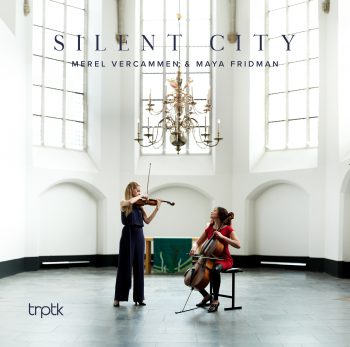
Silent City
Merel Vercammen
Maya FridmanHi-res Download
TTK0067 -
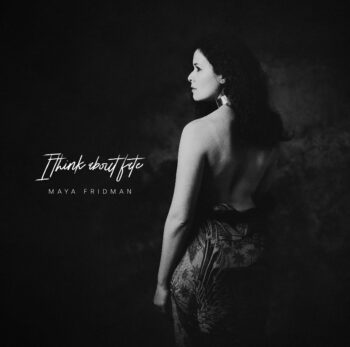
I Think About Fate (Single)
Maya Fridman
Hi-res Download
TTX0004 -
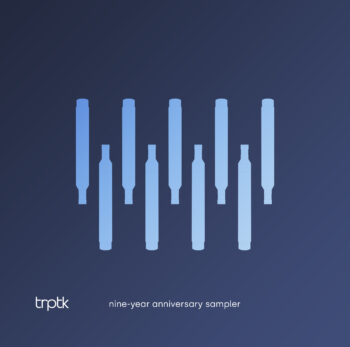
TRPTK nine-year anniversary sampler
Various Artists
Hi-res Download
TTK0119 -

Snake (Single)
Maya Fridman
Hi-res Download
TTX0003 -
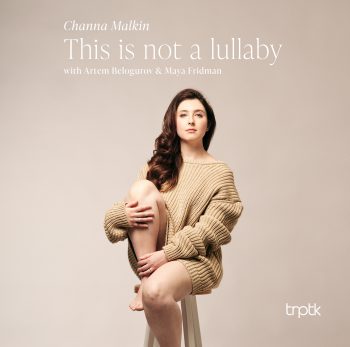
This Is Not A Lullaby
Channa Malkin
Hi-res Download
TTK0069 -
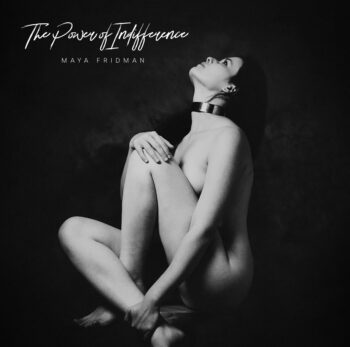
The Power of Indifference
Maya Fridman
Hi-res Download
TTX0001 -
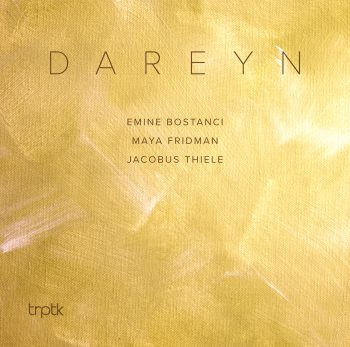
Dareyn
Emine Bostancı
Maya Fridman
Jacobus ThieleHi-res Download
TTK0070 -
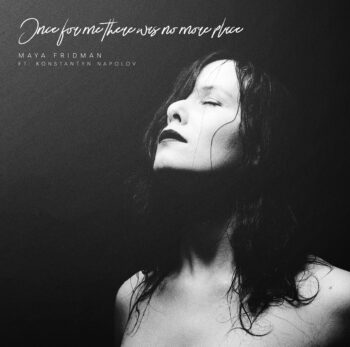
Once for me there was no more place (Single)
Maya Fridman
Konstantyn NapolovHi-res Download
TTX0005 -

Nuït
Maya Fridman
Maarten van VeenHi-res Download
TTK0081 -
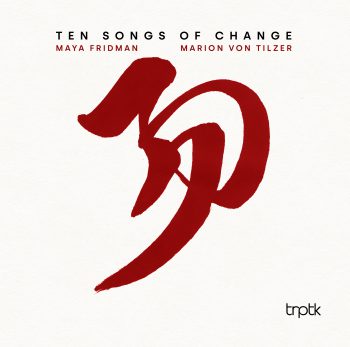
Ten Songs of Change
Marion von Tilzer
Maya FridmanHi-res Download
TTK0059 -
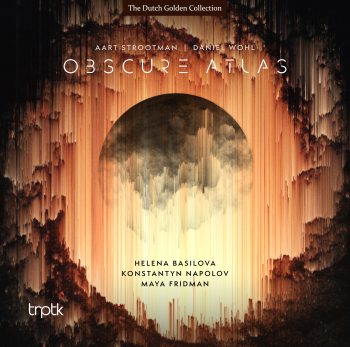
Obscure Atlas
Helena Basilova
Konstantyn Napolov
Maya FridmanHi-res Download
TTK0068


